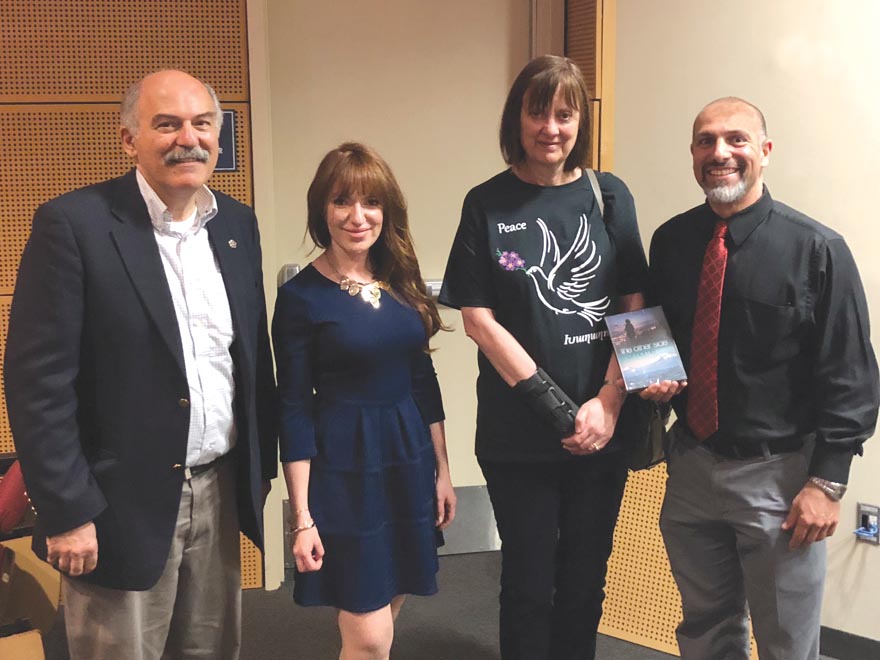
Mkrtchyan, Dr. Mary Husain, and Dr. Matthew Jendian. Photo: David Safrazian
David Safrazian
Staff Writer
“My grandparents were survivors of the Armenian Genocide, so I wanted to make a movie about the human story of the Genocide rather than a documentary,” said Naré Mkrtchyan.
On Friday, April 20, 2018, Mkrtchyan, director of “The Other Side of Home,” was at Fresno State to premiere her film and then follow with an audience discussion. The screening was part of the Spring 2018 CineCulture film series at Fresno State, and was co-sponsored by the Armenian Studies Program and the Department of Sociology. A large audience was deeply engaged in watching the movie.
“The Other Side of Home” is about Maya, a Turkish woman, who discovers that her great-grandmother was a survivor of the Armenian Genocide. The film explores Maya’s struggle between her dual identities—that of perpetrator and victim. Mkrtchyan intentionally chose Maya after posting in a Facebook group, “I am a Descendant of a Survivor of the Armenian Genocide.” Mkrtchyan was searching for someone to embody the inner conflict of the Genocide.
Mkrtchyan wanted to tell a story that could connect with an audience. She was motivated to make the film to honor her family’s history and heritage. Mkrtchyan was proud that the film could engender a lively discussion about identity. “I’m very proud of the dialogue ‘The Other Side of Home’ has created,” said Mkrtchyan. “The film was one of the top ten nominees for an Oscar for best short documentary. I am very grateful.”
The film begins with Maya and her family story in her home in Turkey. She grew up hearing about how her great-grandfather had found her great-grandmother in the woods and saved her. But this she realized was a fairy-tale. In reality her great-grandmother never smiled because she lost most of her family in the Genocide.
Once she had learned about her past, Maya decided to travel to Yerevan on the occasion of the 100th anniversary of the Armenian Genocide. This proved to be a pivotal moment in the movie, as Maya would use the word genocide in private, but could not bring herself to utter the word before the camera. Her fear of the repercussions overwhelmed her sadness of the events.
“We screened it in four continents and various places in America,” stated Mkrtchyan. “I am pleasantly surprised it has received a lot of love. Most of the reactions are good, but there are a small number of people who think I should have taken out the denial part, but the reality is if I took it out, I would be like Turkey because I would be lying and not showing the reality. The truth makes the film stronger.”
Mkrtchyan was born and raised in Armenia and came to America when she was 13 years old. She was drawn to the world of cinema at a very young age and attended the USC school of cinematic arts. She then worked for Oscar-winning producer, Rob Fried’s production company, where she produced over 60 shorts. Mkrtchyan had always wanted to make a film about the genocide and was finally able to do so.
“The Other Side of Home” featured strong direction and a memorable musical score. It is one thing to see a film about the Armenian Genocide with facts and numbers, but it is another thing to see first-hand how the Genocide affects the survivors. This movie provided a new perspective to attract to emotions and hearts.
Mkrtchyan is planning some future movie projects. “I want to work on human issues, to make an impact. I want to make a movie about the aftermath of the Gyumri [Armenia] earthquake of 1988. This will also serve as a fundraiser to help rebuild Gyumri.”
 Hye Sharzhoom Armenian Action
Hye Sharzhoom Armenian Action